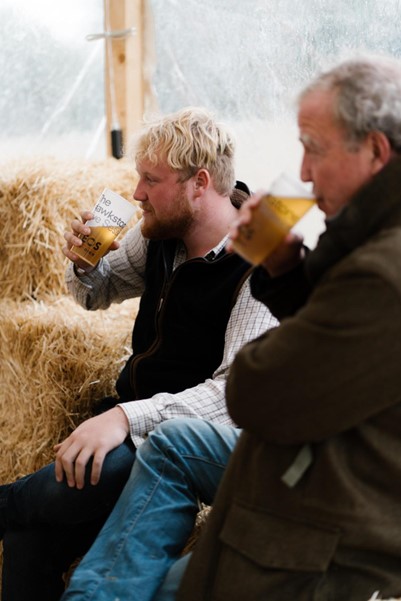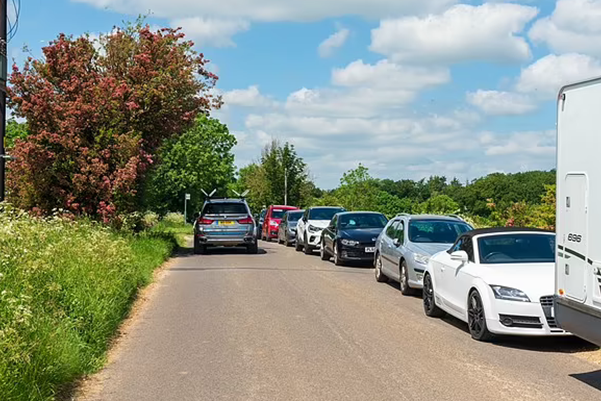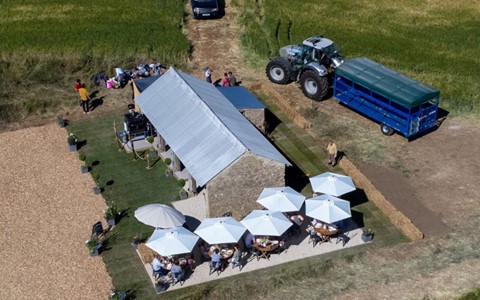Warning - Contains Spoilers!
Clarkson’s Farm 2 arrived on Amazon Prime on the 10th February 2023. This season has had great reviews from viewers and farmers alike. If you haven’t watched this new series of Clarkson’s hilarious antics and adventures in farming, we suggest doing so! The second season picks up where the first left off, with Clarkson continuing to navigate the challenges of running his farm in the Cotswolds. From planting crops to caring for livestock, viewers are given a glimpse into the realities of modern-day farming and the hard work that goes into it. Viewers with an agricultural background will likely relate… though we’d hope they would practice much better Health and Safety procedures!
However, Clarkson’s Farm 2 isn’t just about the day to day running of a farm – it also highlights valuable lessons about the importance of sustainability, both environmentally and financially, the impact of climate change on farming, and the value of community and consumer engagement. In this article, we’ll take a closer look at some of the key highlights from Clarkson’s Farm 2 and share a perspective on his efforts towards ensuring his farm business remains viable in a post Basic Payment Scheme (BPS) world.
At the close of the first season, it was revealed that Diddly Squat Farm generated an income of just £144. This highlighted how tight margins are being squeezed on farm, which will continue to be constricted throughout the Agricultural Transition, due to subsidy loss, volatile markets and input costs. As discussed above, the majority of the episodes revolve around Clarkson attempting to diversify his farm further, in order to generate increased revenue, particularly through “added value” themes, most notably through opening up a restaurant serving farm produce. The series does a brilliant job in portraying the difficulty UK farmers currently face and the importance of a diversified income stream. But what issues does Clarkson face throughout Season 2 and his aspirations surrounding farm diversification?
To begin on a positive note, Diddly Squat Farm shop has seen massive success since its opening in 2020. The shops goods have expanded over time and many of the items within have been sourced from the farm, such as lamb, eggs, honey, a variety of vegetables, jams and preservatives. Diddly Squat Farm shop is a great example of how effective selling directly to the consumer can be, particularly where the shop can provide an authentic and novel experience.


Another great success worth highlighting is the launch and popularity (seen in the range of pubs and stockists) of Hawkstone. The creation of this alcoholic beverage brand is a fantastic example of the added value process and integrates well with the farm shop.
To facilitate this range of product, a joint venture was required between Clarkson and his farm business and a local brewer. The Hawkstone brand and business demonstrates how powerful collaboration can be, highlighting joint ventures as a tangible solution to management, labour and skillset concerns surrounding diversification on farm.
Visit the Hawkstone website to read more about the collaboration.
To us, Clarkson’s Farm 2 highlighted the necessity of creating a thorough vision and strategy for a farm business, especially in the context of farm diversification. A holistic developmental strategy is vital for aligning the various elements and processes in a logical and deliverable manner, increasing the likelihood of success at each project milestone and reducing adverse effects transcending from ill-informed or ad-hoc decisions. An effective strategy should include exit strategies and contingencies for when things don’t go to plan, which is seen throughout Clarkson’s Farm 2 in the form of planning refusals and general day to day farming disasters!

The crux of the season was Clarkson’s various rebuttals with West Oxfordshire District Council (WODC), in his attempt to expand the farm’s consumer facing offering by providing a restaurant. This season also showcased planning refusals and objections surrounding a Prior Notification of an agricultural track and also an Enforcement Notice to Diddly Squat Farm shop itself, regarding its failure to comply with planning conditions. The condition breached was that all produce sold through the shop had to have been produced and sourced from within 16 miles of the shop itself. It transpired that clothing apparel and various other goods were the culprits of this breach!
But why was Clarkson’s farm restaurant application rejected?

There were significant highways concerns voiced by the local authority and local residence in that a restaurant would exacerbate the already problematic traffic and parking around Chadlington. An objective view at some 240 related documents on the WODC planning portal shows an abundance of objection comments, emphasising traffic as a key concern. However, there is also many supporting comments from local residents which list the many benefits of Diddly Squat Farms operations in the area.
Secondly, there was a fundamental concern that furthers development of any kind (including a purpose-built car park) would damage the local landscape character and inhibit enjoyment of the Cotswold Area of Outstanding Natural Beauty (AONB).
An AONB designated area carries with it more stringent planning regulations, which recognise the importance of preserving the natural beauty, biodiversity and cultural heritage of these areas. Planning permission in these areas (similar to a National Parks designation) are inherently more difficult to obtain and where granted, must demonstrate that the proposal will not adversely affect or harm the environment, natural beauty or local community. In this case, the council argued that a restaurant would in fact cause an unacceptable level of adversity.
The WODC expressed, arguably controversial, concerns regarding the proposed restaurant having a further adverse effect on local economy. Although the Cotswolds are a popular tourist destination and there are a plethora of small businesses relying on tourism already, they were concerned that the farm shop and proposed restaurant would take business away from said existing businesses. However, numerous supporting comments were made outlining the increase in business to the area from increased footfall and tourism bought about by Diddly Squat Farm and the Clarkson’s Farm show. Clarkson was audibly frustrated on social media, quite rightly expressing that the restaurant would provide income for the farm and create local employment opportunities.

Change of use through Class R Permitted Development in this context is allowable providing the following conditions are followed: Where the cumulative floor space of the building or buildings which have changed use under Class R within an established agricultural unit does not exceed 150 square metres, provide the following information to the local planning authority—
(i) the date the site will begin to be used for any of the flexible uses;
(ii) the nature of the use or uses; and
(iii) a plan indicating the site and which buildings have changed use;
There are of course, other conditions which must be followed. However, this piece of planning legislation allowed Clarkson to utilise a small farm building (less than 150m2) to realise his farm restaurant in July 2022 in the form of the “Lowland Barn”, which drew the season to a somewhat positive close. Unfortunately, the WODC issued and enforcement notice on 12th August 2022, ordering the restaurant to close, they considered the opening of the restaurant as a “material change of use” likely agitated by matters arising from previous planning applications.

As argued by Clarkson himself, the actions of WODC do not exhibit good support for farmers trying to diversify, which is contrary to the National Planning Policy Framework (NPPF). However, the full restaurant and agricultural track refusal are a complex and multifaceted argument which we could deliberate over forever… so perhaps for another time!
To summarise therefore, we present the 5 key takeaways of Clarkson’s Farm 2 that farmers can draw from when considering farm diversification:
- Diversification can be (when successfully implemented) a significant way to increase farm income, resilience and asset value
- The creation of a holistic strategy encompassing both farming and diversification enterprises and a bold end vision is vital to deliverable success
- Attempt to alleviate issues and factors that may inhibit planning permission early on, such as parking and access
- Attempt to form good relationships with the local community and authorities, through compliance, compromise and win-win design solutions
- If you’re not an international celebrity with 8 million twitter followers, think about your marketing strategy!
At Dudley Peverill, we work hard to deliver farm diversification on behalf of our clients, often encountering matters arising from the above. Contact us today to discuss diversifying your farm or small holding, or how to achieve the above on your farm or estate today.
Click on the button below to book your free discovery call with our farm diversification experts.

